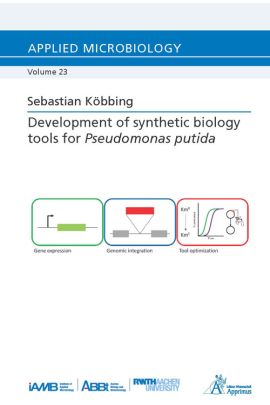Synthetic biology is the engineering of complex, biologically based systems with unnatural functions. Research is starting at small molecules up to cells, tissues, and organisms by applying a rational and systematic synthesis route. Synthetic biology combines different disciplines to pursuing the vision of building up artificial systems, hierarchically designed and inspired by nature, while using standardized and characterized parts. However, a prediction of the outcome is rarely possible because standardization in different biological disciplines is missing, like promoter activity, media composition, and growth rate calculation.
This thesis aimed to increase the number of rationally designed and well-characterized genetic tools for Pseudomonas putida KT2440 to foster synthetic biology. This thesis contributes to the reliability of synthetic biology that often proved as a major issue. The construction of sigma-70 dependent promoters for heterologous expression is discussed in detail, and different approaches are shown. The generation of a stacked promoter library, with the characterization of context-dependent controls, enabled us to predict the resulting promoter activity. Besides synthetic promoters, the frequently used promoters PLac, PTrp, and their derivatives were characterized and compared. Also, the core promoter sequence of a sigma-38 dependent promoter was characterized using a genome walking method, resulting in different length fragments from the upstream sequence of the candidate gene.
The use of plasmids is disadvantageous. Therefore, suitable genomic integrations sites are needed. Here we applied to approaches to identify them. A Tn5 library of P. putida KT2440 was generated and characterized for reporter gene expression. In parallel, we analyzed RNA-Seq data from different cultivation conditions to identify regions along the genome, which are equally expressed. Ten integration sites were characterized in detail using different genetic constructs to determine the influence of the genomic context.
In summary, this thesis contributes to P. putida KT2440 synthetic biology. The increased number of well-characterized tools will further support the many efforts to establish this microbe as a workhorse in the bioeconomy and biotechnological applications. Getting the tough challenges, like the use of aromatic compounds from plastic or lignin as substrates, will distinguish P. putida KT2440 from the well-established microbes.
| Autor | Köbbing, Sebastian |
|---|---|
| Lieferzeit | 3-4 Tage |
| Gewicht | 0.27 kg |
| Erscheinungsdatum | 11.09.2020 |
Dissertationen
Development of synthetic biology tools for Pseudomonas putida
Kurzbeschreibung
Biotechnological applications become a forward-looking alternative to chemical production of fine and bulk chemicals. Microbial hosts with beneficial properties are used to produce all required products. Synthetic biology is tailoring the generation of whole-cell catalysts by metabolic and genetic engineering. Therefore, reliable and well-characterized tools are necessary. This thesis contributes to P. putida KT2440 synthetic biology and is increasing the number of characterized tools.

